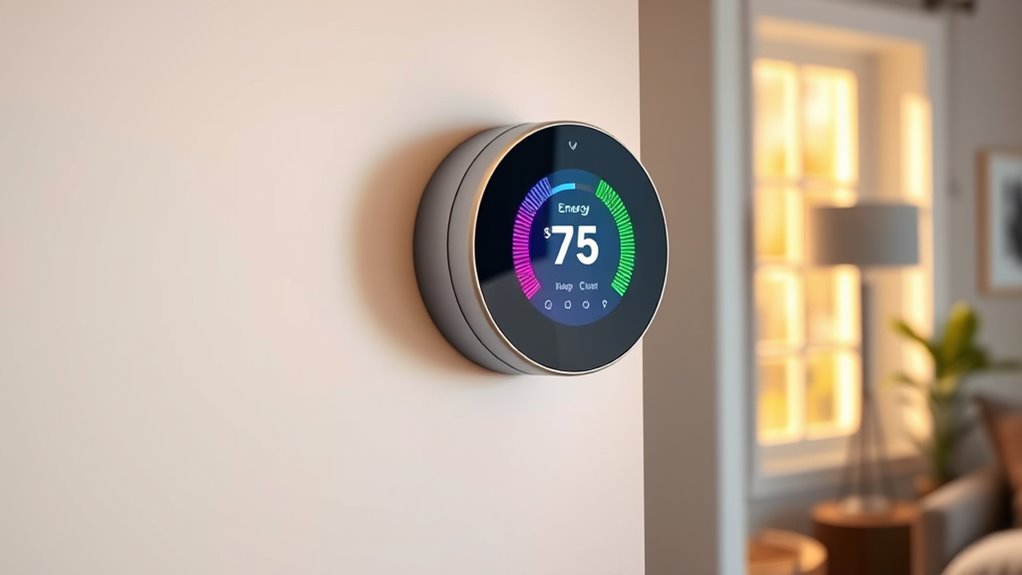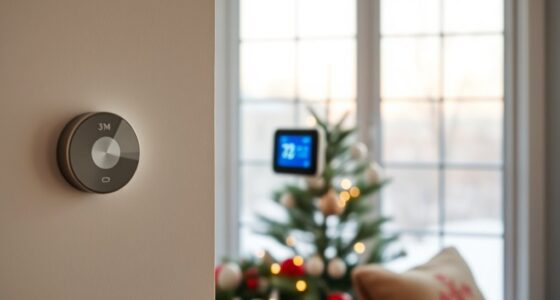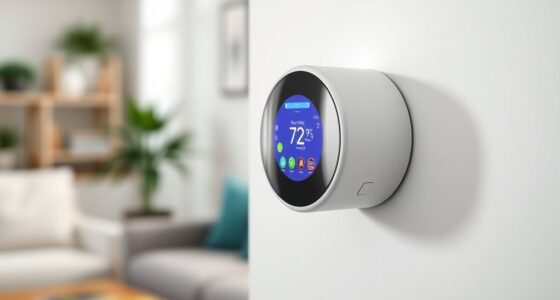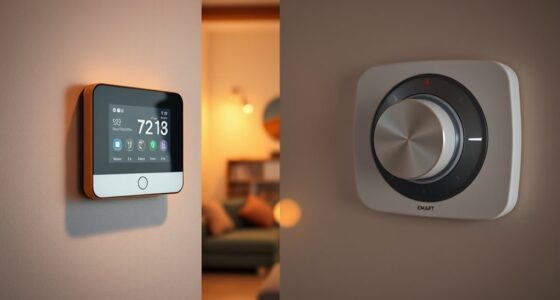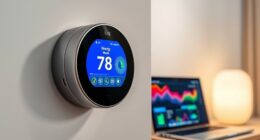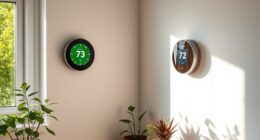Smart thermostat data shows that active user engagement, like setting schedules and monitoring energy use, considerably boosts savings and efficiency. When you tweak settings based on insights, you can cut energy bills by double digits and lessen your environmental impact. Automation improves as manufacturers analyze data to refine algorithms, making devices smarter over time. Continuing with these habits can maximize your energy savings, revealing even more opportunities to optimize your home’s comfort and sustainability.
Key Takeaways
- Data indicates significant energy savings when users actively set schedules and manually adjust thermostats.
- Trends show increased adoption of smart thermostats correlates with reduced overall household energy consumption.
- Automated learning algorithms improve efficiency by adapting to user routines, enhancing long-term energy savings.
- User engagement and behavior play a critical role in maximizing the energy and cost benefits of smart thermostats.
- Ongoing data analysis reveals opportunities for further optimization and personalized energy management strategies.
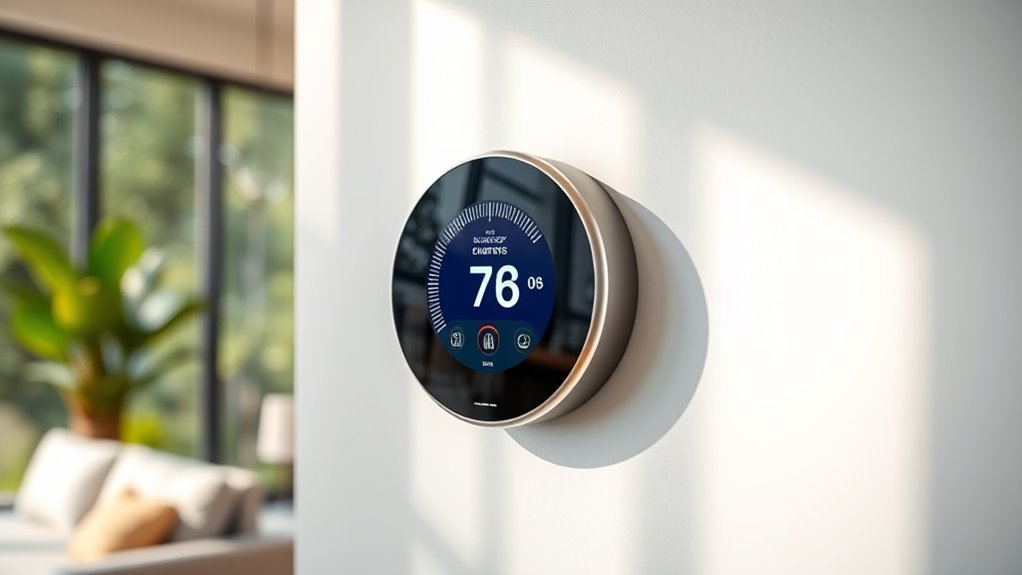
Smart thermostats are transforming how we manage energy consumption in homes and businesses. They are not just gadgets that control temperature; they’re powerful tools that can markedly reduce energy bills and environmental impact when used effectively. The key to revealing their full potential lies in understanding how they influence energy savings and user behavior.
When you install a smart thermostat, you gain more than just remote control over your heating and cooling. These devices learn your daily routines and preferences over time, adjusting settings automatically to optimize comfort and efficiency. This personalization means you’re less likely to leave your HVAC system running unnecessarily, which directly contributes to energy savings. As you become more aware of your habits, you might start noticing patterns—like adjusting the thermostat when you’re away or during certain times of the day—that further enhance savings. This feedback loop encourages more mindful use of energy, making your home or business more sustainable.
Data shows that user behavior plays a vital role in the effectiveness of smart thermostats. When you actively engage with the device—such as setting schedules, tweaking temperature settings, or using the app to monitor consumption—you can achieve better results. For example, manually lowering the temperature during the night or when you’re at work can reduce unnecessary energy use. Many smart thermostats also offer insights into your energy consumption, helping you identify habits that waste energy and suggesting more efficient routines. This empowers you to make smarter decisions, often leading to double-digit percentage reductions in energy bills. Over time, these small behavioral adjustments add up, making a tangible difference in overall energy savings.
Furthermore, the data collected by smart thermostats reveals broader trends that can influence user behavior positively. Manufacturers and energy providers analyze this information to improve device algorithms, creating smarter automation that requires less manual intervention. As users see consistent savings and comfort levels maintained, they’re more likely to continue using these devices proactively. The combination of automated learning and your deliberate actions creates a cycle that promotes ongoing energy efficiency. Incorporating energy data analysis can help users better understand their consumption patterns and optimize their settings even further.
In essence, smart thermostats aren’t just about technology—they’re about how you choose to interact with them. Your behavior, from setting schedules to responding to energy insights, directly impacts how much energy you save. The data shows that when you’re engaged and intentional about your thermostat use, you reveal the full potential of these devices, leading to substantial cost savings and a smaller carbon footprint. Additionally, understanding how to make organic juices at home can encourage healthier lifestyle choices that complement energy-saving habits. Recognizing the importance of regular maintenance and inspections can further optimize device performance and efficiency. As smart thermostat technology continues to evolve, your role in shaping energy consumption patterns becomes even more vital to achieving a sustainable future.
Frequently Asked Questions
How Do Smart Thermostats Impact Long-Term Energy Savings?
Smart thermostats substantially impact your long-term energy savings by optimizing your home’s temperature based on usage patterns. They automatically adjust settings when you’re away or asleep, reducing unnecessary energy consumption. This leads to noticeable cost savings over time while maintaining comfort. By learning your habits, these devices help you use energy more efficiently, giving you control and savings without sacrificing comfort.
Are There Specific Brands More Effective for Energy Efficiency?
Sure, you could treat your smart thermostat like a fashion statement, but some brands actually perform better. When you compare features, brands like Nest and Ecobee often lead in energy efficiency due to superior performance and smart features. Focus on brand performance and feature comparison to guarantee you pick a device that saves energy and money. After all, why settle for a pretty face when you can choose a smart thermostat that truly delivers?
How Do Climate Zones Influence Smart Thermostat Energy Trends?
Climate zones considerably influence your smart thermostat’s impact on energy consumption. In colder zones, you’ll find that smart thermostats help optimize heating, reducing high energy use. Conversely, in warmer areas, they improve cooling efficiency. Your understanding of your climate zone allows you to set smarter schedules and adjust settings, leading to better energy savings. Recognizing these regional differences helps you maximize your thermostat’s efficiency and lower your overall energy costs.
What Are the Privacy Concerns With Smart Thermostat Data?
You should be aware that smart thermostats collect detailed data about your habits, raising concerns about privacy breaches. This data collection can reveal when you’re home, your daily routines, and even personal preferences. If mishandled or hacked, it could compromise your privacy or be used maliciously. Always review privacy policies and secure your device to minimize risks and protect your personal information from unauthorized access.
Can Smart Thermostats Integrate With Renewable Energy Sources?
Imagine your home as a symphony, where smart thermostats orchestrate energy flow seamlessly. You can indeed integrate these devices with renewable sources like solar or wind, enhancing renewable integration. They work with energy storage systems to optimize usage, reducing reliance on the grid. This smart harmony guarantees your energy consumption is efficient, sustainable, and tailored to your lifestyle, turning your home into an eco-friendly masterpiece of modern technology.
Conclusion
As you embrace smart thermostats, you’re planting seeds for a greener future. Each data point is like a drop of water nourishing these seeds, helping them grow into a forest of energy efficiency. Your choices become the roots that strengthen sustainable habits, while the thermostat itself stands as a beacon of innovation. Together, you’re not just saving energy—you’re cultivating a legacy of harmony between technology and the planet. Keep nurturing this growth; a brighter, sustainable tomorrow depends on it.
